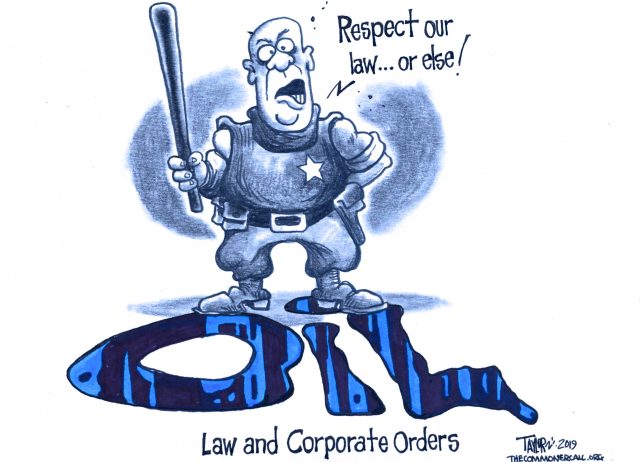
ExxonMobil goes on trial over charges it defrauded investors about climate change.
Guests:
Nicholas Kusnetz, reporter for InsideClimate News. (@nkus)
David Hasemyer, reporter for InsideClimate News. He co-authored the 2016 Pulitzer Prize-finalist series “Exxon: The Road Not Taken,” about (@DavidHasemyer)
*****
Bills Criminalizing Pipeline Protest Arise In Statehouses Nationwide

By Steve Hom
Real News (2/22/19)
The oil and gas industry has started its 2019 lobbying efforts with a bang.
Eight different statehouses across the nation are considering bills criminalizing protests on property owned by the oil and gas industry which critics say could squelch pipeline protesters and others calling attention to climate change-causing infrastructure.
The bills offer steep criminal penalties for trespass onto oil and gas industry-owned private property defined as “critical infrastructure” under state law. The legal definition of “critical infrastructure,” which incorporates essentially all assets serving as the bedrock of the current economic system, has greatly expanded in the post-September 11 era. With that expansion came increasingly harsh criminal enforcement mechanisms available to prosecutors in the name of protecting national security.
Private for-profit oil companies are trying to force the state to use its powers to inhibit and clamp down on the First Amendment rights of people who are looking for ways to try to stop the pipelines.
It is no coincidence that the bills are rolling out simultaneously with nearly identical language, in various states. The Real News has traced these bills back to model bills emanating from two organizations, the American Legislative Exchange Council (ALEC) and the Council of State Governments (CSG), both of which receive generous financial backing from the oil and gas industry. In turn, the organizations serve as facilitators for doling out model legislation to state legislators.
Critical infrastructure bills of this sort, first passed in statehouses in early 2017 following the mobilization at the Standing Rock reservation in North Dakota, have been taken up by both ALEC and CSG for use as model legislation.
In the first month of the year, Indiana, Wyoming, Illinois, Mississippi, Pennsylvania, North Dakota, Idaho, and Ohio have all taken this template-based model legislation under consideration, which mirrors two bills passed in Oklahoma in 2017. Sandwiching them together as one, ALEC created the Critical Infrastructure Protection Act at one of its annual meetings held in December 2017. And the lobbyists and legislators involved in the organization in the room that day gave it a “yes” vote.
Industry written
ALEC is a corporate-backed organization of state legislators and lobbyists; its membership base mostly consists of Republican members of state legislatures. It convenes three times per year for educational panel sessions, networking, and to vote on model bills. Those model bills then get distributed to state legislators nationwide, often becoming state law.
Just a week after ALEC’s Critical Infrastructure Protection Act was approved, the Council of State Governments (CSG), another corporate-funded organization, also adopted the same Critical Infrastructure Protection Act as model legislation, or what it calls Shared State Legislation. Like ALEC’s model bills, CSG also distributes its Shared State Legislation to statehouses across the country. But unlike ALEC, CSG has a bipartisan membership base and its general budget receives funding largely from taxpayers.
The ALEC and CSG model legislation calls for criminal punishment in the form of incarceration or heavy fines for those who “willfully and knowingly trespass or enter property containing a critical infrastructure facility without permission by the owner of the property.” It also allows for conspiracy charges to be brought against “persons who are found to have committed any of the crimes.”
Under the original Oklahoma bills, anyone who trespasses on critical infrastructure can face up to six months in jail and up to a $1,000 fine. If the state can prove intent to damage the property, individuals can be fined up to $10,000 and face a year in prison. And for actually damaging property, protestors can face up to 10 years in prison and be fined up to $100,000. Co-conspirators can see fines of up to $1 million.
In 2017, North Dakota, South Dakota, and Oklahoma all saw like-minded legislation pass, with the two pieces of Oklahoma legislation taken up as the gold standard by ALEC and CSG. Iowa and Louisiana both passed the model bill. Ohio considered the bill in 2018, but it did not pass; it’s been taken up again in 2019. In Wyoming and Minnesota the model bills advanced to the desks of their respective governors, but both received a veto.
CSG receives funding from companies such as Koch Industries, Chevron, ExxonMobil, and Marathon Petroleum, as well as industry trade association groups like American Fuel and Petrochemical Manufacturers, American Chemistry Council, Edison Electric Institute, and American Gas Association. ALEC’s corporate funders include or have included the likes of Koch Industries, ExxonMobil, Energy Transfer Partners, Shell, and a long list of others.
Chilling effect on speech
Critics of the legislation have previously told The Real News that even if does not pass, its introduction creates a chilling effect for frontline activists who commit acts of civil disobedience in defiance of industry projects like pipelines and refineries.
“[The legislation] is going to create a real chill around the communities, the environmental communities, the civil rights communities, and others who are fighting against the pipeline and these energy things,” Bill Quigley, a professor at Loyola University New Orleans, told The Real News in a 2018 interview about the legislation in Louisiana. “This [is] criminalizing of dissent [and] criminalizing of alternative views. Again, the private for-profit oil companies are trying to force the state to use its powers to inhibit and clamp down on the First Amendment rights of people who are looking for ways to try to stop the pipelines.” …
Read the Rest And 10-Minute Video
(Commoner Call cartoons by Mark L. Taylor, 2019. Open source and free for non-derivative use with link to www.thecommonercall.org )
*****
During Bernie’s 2019 speech introducing his Green New Deal, he outlined the basis of his pledge to criminally investigate fossil fuel corporations and executives. He said:
We are finally going to end the fossil fuel industry’s legal immunity. Now what does that mean? This is an important issue.
Look, everybody makes mistakes, everybody in this room has made a mistake, every doctor has made a mistake, every engineer has made a mistake, even politicians ocasionnally make mistakes…
If somebody produces a product and it turns out to be a harmful product and they say oh my god we didn’t know that, that is one thing. And that happens all the time. But when somebody produces a product which they knowingly understand to be harmful, that is a different situation…
Documents have emerged as many of you know in court cases that show that the top fossil fuel executives have known for decades that their products were destroying the planet, and they buried those documents in order to continue making as much money as possible.
So there is a difference between ignorance – just not knowing – and suppressing the truth.
Make no mistake about it: what the executives of Exxon Mobil and other fossil fuel executives are doing is exactly what the tobacco industry did when it lied about the health risks associated with smoking – conduct that led to federal racketeering convictions.
When I am president, I will appoint an Attorney General who will finally hold the executives and the fossil fuel industry accountable for their criminal behavior.


